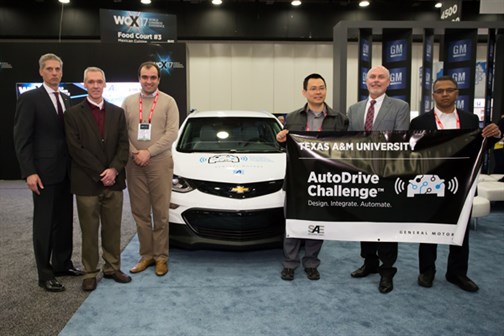 General Motors (GM) and SAE International announced Wednesday that Texas A&M University has been selected as one of eight North American universities to compete in the AutoDrive Challenge over the next three years.
General Motors (GM) and SAE International announced Wednesday that Texas A&M University has been selected as one of eight North American universities to compete in the AutoDrive Challenge over the next three years.
GM will provide each team with a Chevrolet Bolt EV as the vehicle platform. Strategic partners and suppliers will aid the students in their technology development by providing vehicle parts and software. Throughout the AutoDrive Challenge competition cycle, students and faculty will be invited to attend technology-specific workshops to help them in their concept refinement and overall autonomous technical understanding.
The AutoDrive Challenge is a three-year challenge to develop and demonstrate a fully autonomous passenger vehicle. The competition’s technical goal is navigating an urban driving course in an automated driving mode by year three.
“SAE International is excited to expand our partnership with GM to build the future STEM workforce through the AutoDrive Challenge™,” said Chris Ciuca, director of Pre-Professional Programs at SAE International. “Building on our success through programs like Formula SAE, the AutoDrive Challenge™ launches a new platform to engage industry and academia in working toward a common goal of preparing the brightest young minds for the future of autonomous technologies.”
Throughout the three-year competition, students will focus on autonomous technologies and allow for modification and testing. They will work with real-world applications of sensing technologies, computing platforms, software design implementation and advanced computation methods such as computer vision, pattern recognition, machine learning, artificial intelligence, sensor fusion and autonomous vehicle controls.
“GM is very excited to work closely with these eight universities over the next three years,” said Ken Kelzer, GM vice president of Global Vehicle Components and Subsystems. “The students and faculty at these schools bring deep knowledge and technical skills to the competition. We are proud to help offer these students the hands-on experience necessary for them to make an immediate impact on the automotive world when they graduate.”
The Texas A&M College of Engineering has been leading autonomous vehicle research in several departments and programs. For this competition, the college will assemble a multidisciplinary team that includes students and researchers from the departments of civil, computer science, engineering technology and industrial distribution (ETID) and mechanical engineering.
The announcement was made at WCX 17: SAE World Congress Experience in Detroit, and assistant professor Dr. Alireza Talebpour was among the contingent of Texas A&M researchers on hand for the announcement.
"This is a very exciting opportunity for our engineering students to work closely with leaders like General Motors and SAE International and do meaningful work in a cutting edge field like autonomous vehicles," Talebpour said. "This is also another big step in Texas A&M's continuing effort to lead in autonomous and connected vehicle research."
Dr. Srikanth Saripalli added that the AutoDrive Competition will add another level to the college’s opportunities for undergraduate students to get experience working in this increasingly popular area.
“We are also in the process of deploying autonomous shuttles on campus at Texas A&M along with continuing to develop and testing our autonomous vehicles at the nearby RELLIS Campus,” Saripalli said. “This competition enables us to get even more undergraduate students interested and excited about autonomous systems and vehicles”
The Chevrolet Bolt provided by GM will be the fifth vehicle in the Texas A&M Engineering autonomous research fleet, joining a Kia Soul (civil engineering), a Lincoln MKZ and Polaris GEM e4, (mechanical engineering) and a Ford F-150 (ETID).
The other universities that will be competing in the AutoDrive challenge are Kettering University, Michigan State University, Michigan Tech, North Carolina A&T University, the University of Toronto, the University of Waterloo and Virginia Tech.
Photo provided by General Motors.